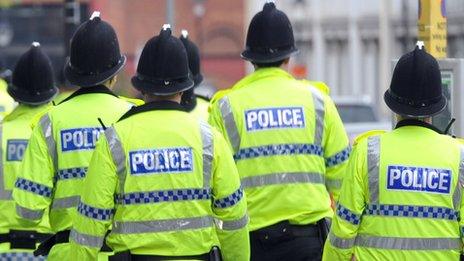Police to give more detail about unsolved crimes
- Published

The government said the changes would help to "restore public confidence"
Police forces in England and Wales are to change the way they record offences from April to give the public a clearer idea about why crimes are not solved.
The "undetected" category will be replaced by a series of new ones such as "prosecution prevented", for example if a suspect is too ill to stand trial.
Ministers say it will discourage forces from claiming offences have been cleared up when they have not.
Labour said changes could not hide a recent decline in detection rates.
Home affairs correspondent Tom Symonds said the aim was to give a clearer picture of how police had dealt with a crime report by concentrating on outcomes rather than detections.
Irene Curtis, Police Superintendents Association: "It's about giving the public that clarity"
'Community resolution'
Currently police can record cases as resulting in a charge, a caution or as undetected. About 70% are recorded as undetected.
Other new categories replacing undetected will include:
"Community resolution" for when a suspect is dealt with without prosecution, such as when stolen items are given back
"Evidential difficulties" for when witnesses are unwilling or unable to give evidence
"Prosecution not in the public interest"
Police will also be able to mark an investigation as complete - unless further evidence emerges.
Irene Curtis, president of the Police Superintendents' Association in England and Wales, said the changes would help to make it clearer to the public how the police worked.
"It might seem to some like excuses but it's really important that the public recognise that quite often it's actually outside the police's control as to whether a prosecution takes place," she said.
It might be that the Crown Prosecution Service has made a decision not to prosecute, the offender has died or become too ill to be charged or a key witness or victim has decided not to support the prosecution, she added.
Policing Minister Damian Green told BBC News: "Crime is definitely falling on all measures we have but clearly there've been some problems with measurement so we need to restore public confidence.
"But also, even more importantly, the police need to have information from the crime figures that actually enable them to cut crime."
The new system will come into force in Humberside on 1 January before being used in the rest of England and Wales from 1 April.
The government says the new framework could be especially useful in claims of historical sexual abuse where the alleged offender has died, is too ill to stand trial or a key witness does not want to give evidence.
'Hollowing out'
Labour's shadow crime and security minister Diana Johnson said: "No amount of changing the statistics can get away from the fact that fewer prosecutions are taking place for domestic violence, child sex abuse and rape on this government's watch."
She said this was "despite more crime being recorded for these most serious crimes".
"And 30,000 fewer crimes of all types are being solved since 2010 given the decline in detection rates in the last three years," she added.
"There may be good reason for some of these changes but, given the government's track record in trying to hide the reality of the impact of their decisions on victims and the police, suspicions will remain that these changes are more about covering up the hollowing out of the police service the public now receive."
- Published20 November 2013
- Published19 November 2013
- Published30 April 2013